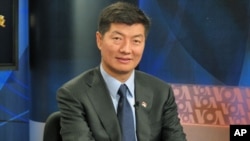The elected leader of the Tibetan exile community based in India is calling for an international probe into this week's killing of Tibetan protesters by Chinese security forces.
Lobsang Sangay, the Tibetan Exile Kalon Tripa or Prime Minister, called for a worldwide vigil on Wednesday February 8 to condemn this week's killings. He accused China of killing six Tibetans by "firing indiscriminately" into crowds of peaceful protesters in Tibetan areas under Chinese control.
"Because of gruesome acts such as these and the systematic repression of Tibetans, the resentment and anger amongst Tibetans against Chinese government has only grown since the massive uprising of 2008," he said.
Watch VOA video of Tibetan protesters in Dharmasala, India
China admits killing one protester, whom Beijing labels a "rioter," after alleging the protesters began using knives, stones, and gasoline against police.
Lobsang called on China to "heed the cries" of at least 16 Tibetans who have burned themselves to death over the past year in protest. He also called for international intervention.
"I call on the international community to show solidarity and to raise your voices in support of the fundamental rights of the Tibetan people at this critical time. I request that the international community and the United Nations send a fact-finding delegation to Tibet and that the world media be given access to the region as well," he said.
In the northern Indian town of Dharamsala Wednesday night, Tibetan monks led a candlelight protest of the killings.
Tibetan activist Dolkar says demonstrations will continue.
"We are very shocked to learn that a group of Tibetan non-violent protesters were directly shot by the Chinese military forces. We are going to protest against it, and we will urge all of the international community to stand against it," said Dolkar.
China considers Tibet an integral part of its historical territory, and occupied the plateau in 1950. Beijing says its investments in infrastructure have benefited the region's inhabitants. However, it keeps the region under tight security and has recently barred foreigners altogether from visiting.
Tibetans accuse China of deliberately seeking to eradicate traditional Tibetan culture. They say China has flooded Tibet's historical territory with non-Tibetan Chinese who often discriminate against them. Tenzin Tsundue, a Tibetan activist and writer, describes China's use of violence on protesters as an act of desperation.
"They showered bullets on people who are nomads and farmers. They are losing control in Tibet. They are unable to understand the true aspirations of the Tibetan people. The people want freedom. And the people of Tibet have made very clear that they want His Holiness the Dalai Lama back in Tibet," said Tenzin Tsundue.
The Dalai Lama, Tibetan Buddhism's spiritual leader, crossed into India in 1959 after a failed uprising against Chinese military rule. He advocates autonomy for Tibet under Chinese rule, but Beijing views him as a separatist in disguise. China says it had no choice but to open fire on protesters this week when they turned violent-- and calls the string of self-immolators "terrorists."




